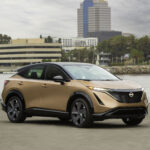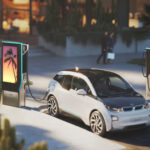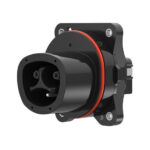Seven global automakers, including BMW Group, General Motors, Honda, Hyundai, Kia, Mercedes-Benz Group, and Stellantis, jointly announced an adventurous plan to create a new fast-charging network in North America, which would “elevate customer experience“.
According to the official press release, the plan is very ambitious, and it could potentially become one of the most important fast-charging networks in the United States and Canada.
The seven partners intend to install at least 30,000 high-power chargers in urban and highway locations (with multiple available at each site), which will be compatible with two charging connectors – the Combined Charging System (CCS1) and North American Charging Standard (NACS), and will be available to all battery-powered electric vehicles from any automaker.
* The number of planned chargers is comparable with the total number of currently installed DC fast chargers in the U.S. (32,000, according to the U.S. Department of Energy, as of July 2023), used by more than 2.3 million vehicles. The NREL (National Renewable Energy Laboratory) estimates that 182,000 DC fast chargers might be needed by 2030.
But it’s not only the scale which is very large. The yet unnamed network is promised to offer the highest reliability and quality, including canopies (“wherever possible“) and amenities (“restrooms, food service, and retail operations either nearby or within the same complex“), which alone would be a big distinguishing factor over other charging networks.
All-electric vehicle users could potentially look forward to a very convenient charging process thanks to Plug & Charge technology (with all authentication and payment processes integrated into the vehicles).
Here is how the seven automakers describe their plan to achieve “Elevated Customer Experience”:
“The new high-powered charging network will elevate the entire EV experience and drive EV adoption.
The network will provide a seamless, vehicle integrated, best-in-class charging experience, based on renewable energy and supported by the quality, reliability, and resources of world-leading automakers.
Focused on customer comfort and charging ease, the stations will be in convenient locations offering canopies wherever possible and amenities such as restrooms, food service and retail operations either nearby or within the same complex. A select number of flagship stations will be equipped with additional amenities, delivering a premier experience designed to showcase the future of charging.
Initial plans call for the deployment of charging stations in metropolitan areas and along major highways, including connecting corridors and vacation routes, aiming to offer a charging station wherever people may choose to live, work and travel.
The functions and services of the network will allow for seamless integration with participating automakers’ in-vehicle and in-app experiences, including reservations, intelligent route planning and navigation, payment applications, transparent energy management and more. In addition, the network will leverage Plug & Charge technology to further enhance the customer experience.”
The whole idea sounds very promising. Without a doubt, fulfilling all of these promises would make the new charging network very competitive (at least depending on pricing), or maybe even catapult it to the forefront of the industry.
However, as of today, the seven manufacturers and founding members (and potentially some additional ones who will join the endeavor at a later point) must fork out billions of dollars to cover the necessary investments.
A big part of the plan is to secure public funds through the new U.S. National Electric Vehicle Infrastructure (NEVI) program.
“With the generational investments in public charging being implemented on the Federal and State level, the joint venture will leverage public and private funds to accelerate the installation of high-powered charging for customers. The new charging stations will be accessible to all battery-powered electric vehicles from any automaker using Combined Charging System (CCS) or North American Charging Standard (NACS) and are expected to meet or exceed the spirit and requirements of the U.S. National Electric Vehicle Infrastructure (NEVI) program.”
The new joint venture is expected to be established later this year, while its first charging stations could open in the US in the summer of 2024 – with the first installations in Canada to follow later.
We hope to hear more details about the planned charging infrastructure in the coming months, including timeframes.
This new joint venture fast charging network is reminiscent of the Ionity network in Europe, which also was established by a few automotive groups and later joined by a few additional ones. The European plan was to create a continent-wide charging network for CCS2-compatible vehicles, since Tesla had its exclusive Supercharging network at the time and was not even using CCS2. The other priority of the European network was to offer a premium charging experience, though it did fall short of “premium” expectations at least in the beginning, and even the rollout was noticeably delayed.
It is worth pointing out that the founding members of this North American charging network are very diverse. Some of them (such as General Motors and Mercedes-Benz) have already officially signed up to use the NACS charging connector starting in 2025, while others remain silent about an eventual switch from the CCS1. Some of the manufacturers were engaged in charging infrastructure projects with third-party charging networks, while others were very distant. Similarly, they vary regarding their all-electric car sales scale and plans – some have already invested heavily, while others are only just starting.
The most intriguing thing is those who are not (or at least not yet) on board with the new joint venture – Volkswagen Group, which operates the Electrify America charging network, and Tesla, which has its own Supercharging network. And why was Ford not interested in joining the project? We can only guess that smaller players, like Rivian or Lucid, are not ready for capital-intensive investments (though Rivian is building its own, very specific Rivian Adventure Network). Another item of consideration is how the new project will affect Mercedes-Benz’s plans to build its own global fast-charging network. Overall, there are a lot of questions left to answer.
We will be researching all of these topics in the coming months.
Here are comments from the founding members of this joint venture:
BMW Group CEO Oliver Zipse:
“North America is one of the world’s most important car markets – with the potential to be a leader in electromobility. Accessibility to high-speed charging is one of the key enablers to accelerate this transition. Therefore, seven automakers are forming this joint venture with the goal of creating a positive charging experience for EV consumers. The BMW Group is proud to be among the founders.”
GM CEO Mary Barra:
“GM’s commitment to an all-electric future is focused not only on delivering EVs our customers love, but investing in charging and working across the industry to make it more accessible. The better experience people have, the faster EV adoption will grow.”
Honda CEO Toshihiro Mibe:
“The creation of EV charging services is an opportunity for automakers to produce excellent user experiences by providing complete, convenient and sustainable solutions for our customers. Toward that objective, this joint venture will be a critical step in accelerating EV adoption across the U.S. and Canada and supporting our efforts to achieve carbon neutrality.”
Hyundai CEO Jaehoon Chang:
“Hyundai’s investment in this project aligns with our ‘Progress for Humanity’ vision in making sustainable transportation more accessible. Hyundai’s expertise in electrification will help redefine the charging landscape and we look forward to working with our other shareholders as we create this expansive high-powered charging network.”
Kia CEO Ho Sung Song:
“Kia’s engagement and investment in this high-powered charging joint venture is set to increase charging access and convenience to current and future drivers and therefore accelerate the transition to EVs across North America. Kia is proud to be an important part of this joint venture with other reputable automakers as we embark on a journey towards seamless charging experiences for our customers and further strengthening Kia’s brand identity in the EV market.”
Mercedes-Benz Group CEO Ola Källenius:
“The fight against climate change is the greatest challenge of our time. What we need now is speed – across political, social and corporate boundaries. To accelerate the shift to electric vehicles, we’re in favor of anything that makes life easier for our customers. Charging is an inseparable part of the EV-experience, and this network will be another step to make it as convenient as possible.”
Stellantis CEO Carlos Tavares:
“We intend to exceed customer expectations by creating more opportunities for a seamless charging experience given the significant growth expected in the market. We believe that a charging network at scale is vital to protecting freedom of mobility for all, especially as we work to achieve our ambitious carbon neutrality plan. A strong charging network should be available for all – under the same conditions – and be built together with a win-win spirit. I want to thank each colleague involved, as it is a milestone example of our collective intelligence to listen and serve our customers.”








0 Comments